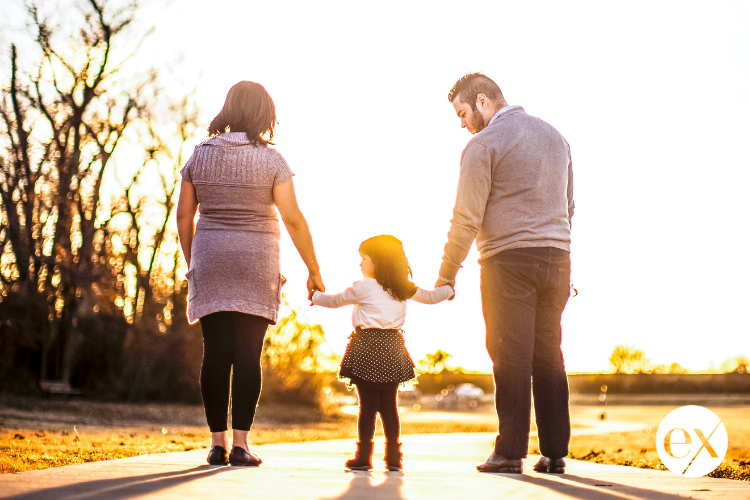
Going through a divorce, especially if you have kids, is never easy. How are they handling it? How will this affect their future relationships? How can you help them?
This is where Amy Armstrong focuses her attention. Her work as a Certified Parent coach at the Center for Family Resolution allows her to deal with these kinds of questions, which you may have yourself. She helps parents and kids going through divorce and joined T.H. and Jessica on the Divorce etc… podcast to delve into questions about how to talk to your kids during any stage of the divorce process.
A Little Bit About Amy
Amy discovered her passion for helping parents and their children through her initial work in parent education. “So many parents would want me to stay after class and talk,” Amy remembers. The parents had so many additional questions for her, and she found out how people’s lives can change with the information she could provide. So she got the credentials she needed as a coach and then started the Center for Family Resolution. Most of Amy’s business is court-ordered coaching for co-parents, so she joined Jessica and T.H. on the Divorce etc… podcast to talk about the best tips she can give to parents who are helping navigate divorce with children.
Getting Co-Parents on the Same Page
So many parents want to do the right thing, of course. They know they shouldn’t be hostile or talk shit about the other parent, but it’s a struggle, especially throughout a divorce.
A lot of this can be due to the root of communication challenges. “People are not doing well themselves,” Amy reveals. “It’s the stress. It’s the uncertainty. It’s the fear.”
Now, this is normal. But Amy works with her clients to help them be more aware of this trait and helps them practice techniques like taking breaths or setting boundaries when these emotions come back up when communicating with their co-partner. And this type of snap isn’t only directed at your former partner but can come out toward anyone around you when you’re feeling distressed, including your kids.
“Our job in learning to communicate better is to self-manage, to self-regulate,” Amy explains. “We need to do self-care ahead of time. There’s no way you can recover in the heat of the moment. We’ve got to keep ourselves ahead of it by having our self-care practices every day.”
Stay Married for the Kids?
Is wanting to stay married for the kids a valid reason to push through? Amy breaks down some myths with this reasoning.
“The only time that it really is good to stay for the kids is if you’re truly growing as people,” Amy discloses. If you’re able to self-manage and can feel good about yourself in this relationship, sure, you can try sticking it out for the kids.
Amy’s seen a few situations where parents try to stick it out for the kids – financial reasons, for the safety of their kids from one stand-alone parent who might be struggling, parents who want to wait and work the situation out before going through the divorce so the kids struggle less.
This decision is really an individual one and is never exactly the same as someone else’s, as is the case with all divorces – every situation is different. But sometimes Amy encounters a situation where the parents are trying to stay together, yet they aren’t doing any work to grow themselves. In that case, she says this is not the best option for the kids, and that it’s unhealthy for the kids to watch a relationship that isn’t working.
Talking to Kids About Divorce
Nobody knows what to say when the time comes to talk to the kids. How do you even start? A lot of people only really want to mention it once, and avoid bringing it up again because they don’t want to keep reminding them. Jessica says that she now regrets not bringing it up to her kids more over the years – she was afraid that by mentioning it, she would be causing more issues when in reality the opposite is true.
If this is a confusing time for you as a parent, imagine how confusing it is for the kids. They don’t need you to unpack your adult relationship for them. “What they need,” Amy breaks down, “is to know how often they’re going to be seeing each parent, and where the parent who’s leaving the household is going to be.”
If you don’t know this information, that’s ok, just talk about what you do know. Kids need certainty and security, and these are two things they can only really get from their parents. Even if you don’t know what the end game is going to be, even if you don’t know what the custody situation is going to look like, if you are certain of what’s going on in the current future, that’s what the kids need to know. So you may not know what the breakdown of custody will be, but if you know that for the time being the kids will be with you Mondays and Tuesdays and every other weekend, then you can explain that. They just need to know what to expect right now.
“The children are going to feel more secure when they know what their experience will be, that they’re going to be seeing their parents in two different places.”
Honesty is (Sometimes) the Best Policy
One question that comes up frequently is about how honest you should be with your kids. Jessica and T.H. both had this question during their divorces, trying to figure out what they should and shouldn’t tell their kids, especially when they had so many questions themselves.
So what should you be honest about? “You can be honest saying it’s hard,” Amy suggests. “You can be honest about saying we have a lot of things to figure out. You can be honest saying we don’t really know how this is going to look.” But Amy recommends following up with this uncertainty with things you do know for sure, such as where each parent will be. Give them that short-term plan so they know what’s going on right now.
Bottom line, yes, be honest, but they don’t need the dirty details, all the conflict, all the chaos. Just give them what they need to know and what the plan for the near future looks like for them.
Will My Kids Be Okay?
Sure, Jess sometimes jokes about how messed up kids may end up from divorce (she says she won’t really know how f’ed up her kids are until they’re adults in therapy themselves), but it is a question that can bring up a lot of fear in a parent. T.H. and Jessica sometimes talk about this worry, especially now that some of their kids are young adults and navigating relationships themselves.
Amy’s got some good news for you. You can influence how they view relationships by how you handle them yourself. The most important thing is to take good care of yourself so you avoid dumping all of your confusion on your kid and projecting your relationships onto theirs. “If we’re okay, our children are going to be okay,” Amy reassures us.
Now, this doesn’t mean you can never show emotion and always have to be stoic for the kids’ sake. It’s also about allowing yourself to feel and be human and sharing that emotion with your kids without making it their responsibility to fix us. “How we handle our own empowerment is what’s going to help inspire our children to be empowered.”
And even if you begin noticing your kid going through rough patches in their relationships, remember it’s part of growing up. Your kids working their way through relationship issues does not mean it’s a direct correlation or influence of your divorce. By giving them a good example of how to handle a relationship and grow from it, they’ll learn what is healthy and unhealthy and find the right person for themselves.
The bottom line is: remember to focus on yourself. By taking care of yourself, and by being empowered even after a divorce, your kids will grow up seeing a role model they can look up to and model relationships based on how you handle your own. If you’re okay, they’re going to be okay.
Leave a Comment
You must be logged in to post a comment.










